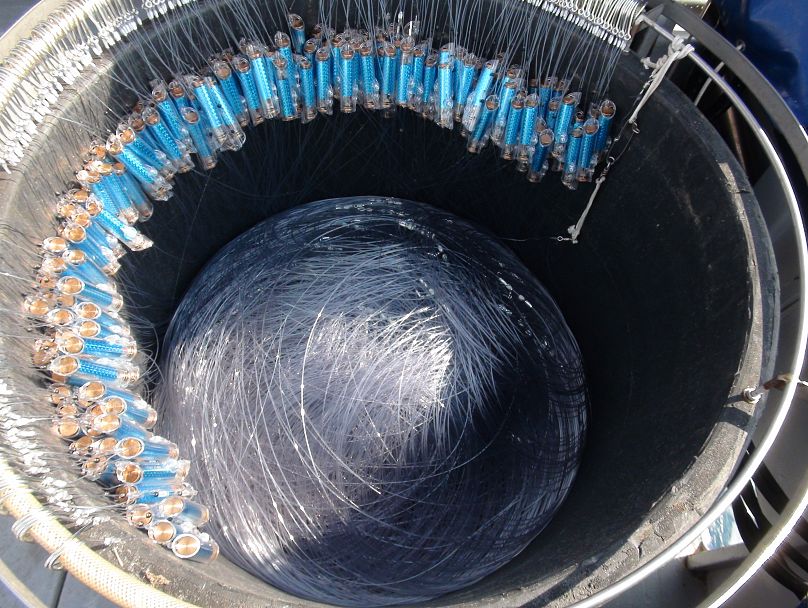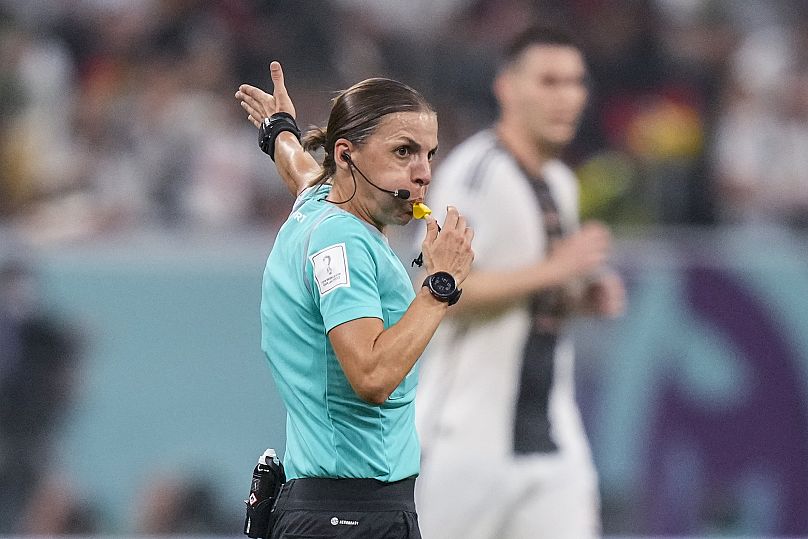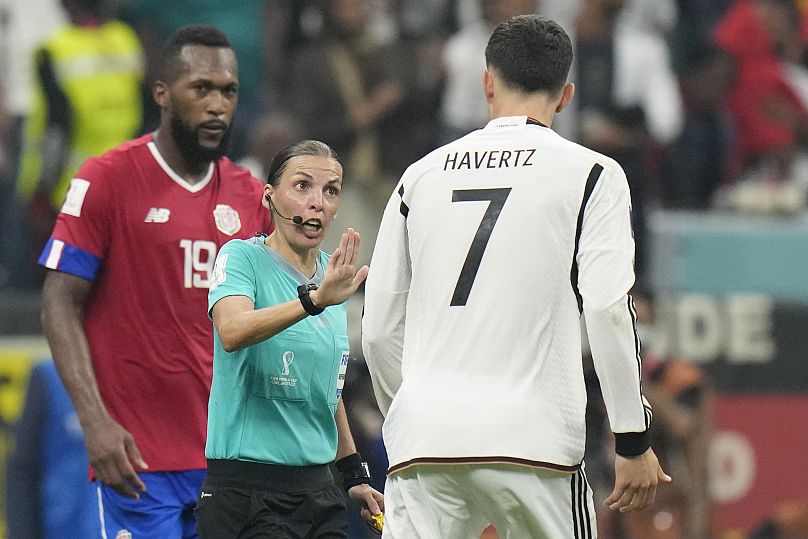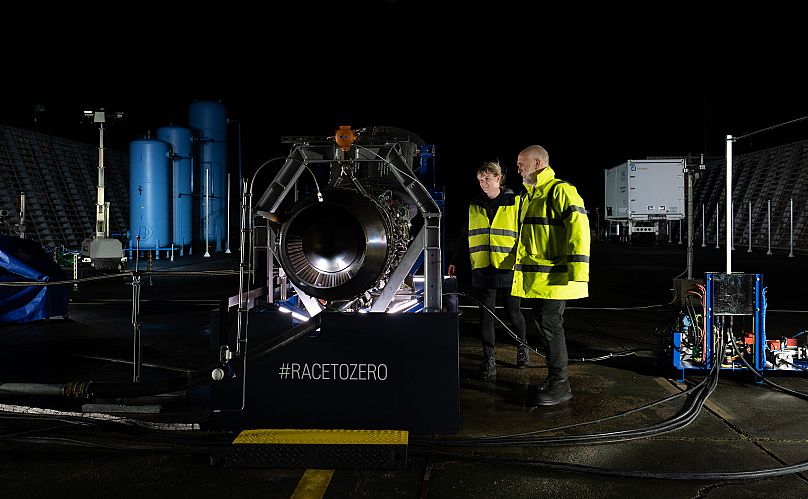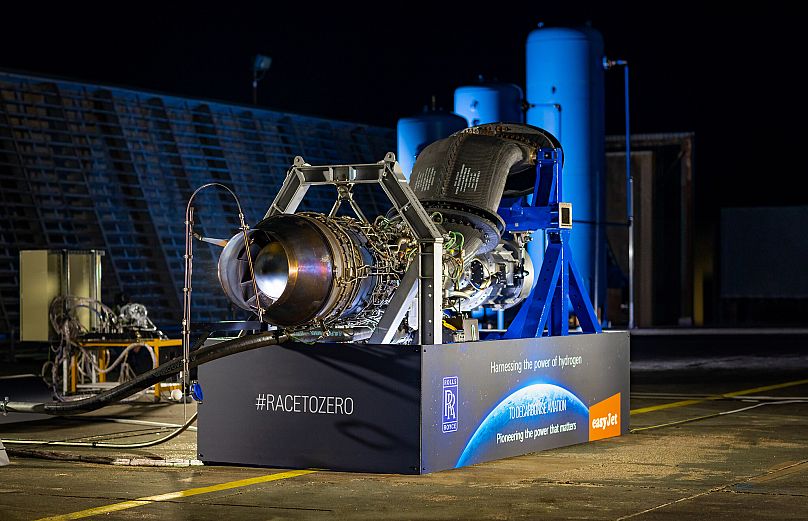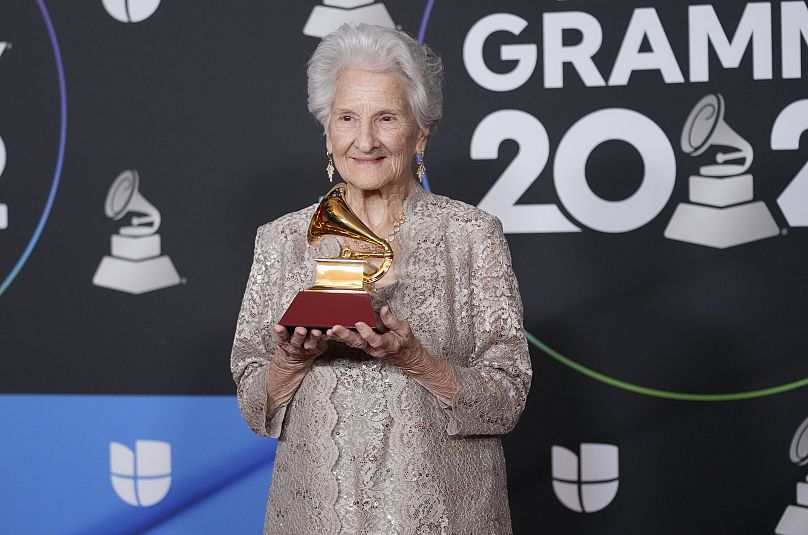Several world firsts took place this week, including a green solution for the aviation industry.
Welcome to the Good News round-up; if you made it here, you’re looking for positive stories, and we have you covered. Here are today’s positive headlines; we hope they will make you feel good – and inspired.
The first 3D-printed wartime school to be built in Ukraine; a new device that could reduce shark bycatch by 90 per cent; the first woman to referee a men's World Cup match; Rolls-Royce and easyJet have successfully trialled a green solution for the aviation industry; and lessons from the 95-year-old who won the best new artist at the Latin Grammys.
Click the video above to get the full digest and find out more on the following:
1. The first 3D-printed wartime school to be built in Ukraine
Since the Russian invasion began last February, over 2,000 schools in Ukraine are said to have been damaged or destroyed, but thanks to a pioneering project, there is hope that many Ukrainian children will be able to resume their education.
Non-profit tech and humanitarian start-up TEAM4UA is behind this ambitious initiative, which aims to build schools using 3D printers working with city authorities.
Various companies have offered to donate the technology and the foundations of the world’s first-ever 3D-printed school to be built in a war zone have already been laid on a street in Lviv, which is home to many of the people displaced by the war.
Jean-Christophe Bonis, founder of Team4UA, explains why the first goal is to 3D-print an educational facility: “Because a lot of IDPs are here [in Lviv], refugees from the other part of Ukraine, and these children need to be able to keep flowing, having a life.”
Bonis says his objective is to first create a pilot, “something that is relevant, and the school is the best way to mix the needs here on the ground. Of course, after we will help to build hospitals and houses, because a lot of people have lost everything, but that is the next phase. First to show, and then after, to scale up."
2. A new device that could reduce shark bycatch by 90 per cent
Every year around 100 million sharks, skates and rays are killed as a result of fishing for bluefin tuna.
Since 1970, global numbers of ocean sharks and rays have declined by 71 per cent thanks to this practice, but a clever new device should mean that bycatch is drastically reduced.
The SharkGuard emits a short pulse every two seconds to repel sharks and rays from fishing hooks. The pulse briefly triggers the electrical sensors around a shark’s mouth, causing the fish to swim away.
Dr. Rob Enever, head of science and uptake at Fishtek Marine, the conservation engineering company that designed and and manufactured the gadget, explained to Euronews that sharks and rays, (elasmobranchs, as the group is called) are different to other fish in that they have receptors in their skin.
“Essentially there are small gel-filled sacs in and around the nose that are highly sensitive to electric fields. They are highly sensitive in a way other fish aren't.”
Enever says the logic behind the invention was simply that “if the fish that you don't want to catch are sensitive to electric fields, then maybe we should be investigating electric fields to make sure that we don't catch sharks, but we do catch the tuna.”
In trials at a long-line tuna fishery in France, the SharkGuard has proved to be very effective at reducing the number of sharks and stingrays caught by commercial fishing gear.
“We were able to see that the effects of the SharkGuard reduced the bycatch of sharks – blue sharks in this instance – by 91 per cent, and reduced capture of the pelagic stingray that they catch in that fishery by 71 per cent,” he said.
Enever says the successful trial of the device makes for a “really nice story of ocean optimism.”
“We hear all the stories of species decline continually, but there are companies out there, like us, and many others as well, doing some great things.”
FishTek Marine hopes the SharkGuard will be commercially available by 2024.
3. The first woman to referee a men's World Cup match
Stéphanie Frappart from France has made history as the first woman to take charge of a men's World Cup match when she refereed the Costa Rica–Germany game on December 1.
Her assistants were Brazilian Neuza Back and Mexican Karen Díaz Medina, making theirs the first-ever all-female referee team to take part in a men's World Cup tournament.
Frappart became the first woman to officiate at a men's World Cup qualifier in March and at a Champions League match in 2020.
The French referee said she felt enormous emotion because it wasn't particularly expected that she would be picked, “(I feel) a lot of pride, a lot of honour, to represent France at the World Cup."
But she’s clear about remaining focused. “I'm really going to head into this with enormous emotion, but you have to channel that because clearly, the important thing is the pitch."
In total, six women were selected to referee games for the Qatar 2022 World Cup.
They earned the position by passing the same fitness tests as their male colleagues and being held to the same performance standards.
4. Rolls-Royce and EasyJet have successfully trialled a green solution for the aviation industry
Britain's Rolls-Royce and easyJet say they have set a world first for the aviation industry after the successful test of an aircraft engine powered entirely by green hydrogen created by wind and tidal power.
The luxury car maker said the ground test was a “major step towards proving that hydrogen could be a zero-carbon aviation fuel of the future.”
Rolls-Royce and EasyJet are aiming to show that hydrogen can help the aviation industry achieve its goal of reaching net zero by 2050.
5. A 95-year-old won best new artist at the Latin Grammys
Stan Lee, the father of Marvel Comics, didn’t create his first superhero until he was nearly 40 years old, when he published the Fantastic Four.
Vera Wang didn't design her first dress until she was 40.
Miguel de Cervantes was in his fifties when Don Quixote was published, and French artist Paul Cézanne was of a similar age when his work received recognition.
And now a 95-year-old woman, Angela Álvarez, is the oldest person to be nominated and to win in the category of best new artist at the Latin Grammys.
She is living proof that it is really never too late to pursue your dreams.
Álvarez told Spanish news agency EFE that she began writing songs in 1942 in Cuba with the dream of becoming an artist, but it took her eight decades to release her first album, publishing her first one just last year, encouraged by her grandson.
The musician said the way she felt was “indescribable:”
“What I feel is such a wonderful and beautiful thing and I can't find the words to express what I really feel. I feel very happy and content and very proud of what has happened in my life," she said.
If you enjoy the Good News round-up, the most positive thing you can do is like this video, leave us a comment and share it with your friends.
Until next time, and remember, it can be hard to find among the headlines, but some news can be good news.












